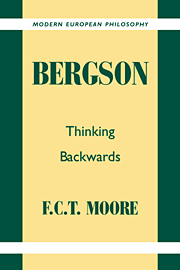Book contents
- Frontmatter
- Contents
- Abbreviations
- Preface
- Introduction
- 1 The Requirement of Precision
- 2 Philosophy and Knowledge: Uses and Misuses of ‘Representation’
- 3 Durance: Unfolding in Time
- 4 Laughter
- 5 Tension
- 6 Aporetic Philosophy
- 7 Branching
- 8 Going Beyond
- 9 Magic and the Primitive: The Antinomies of Pure Intelligence
- 10 Paradoxical Epilogue: Reason Ruefully Repressed
- Works Cited
- Index of Names
- Index of Subjects
8 - Going Beyond
Published online by Cambridge University Press: 05 June 2012
- Frontmatter
- Contents
- Abbreviations
- Preface
- Introduction
- 1 The Requirement of Precision
- 2 Philosophy and Knowledge: Uses and Misuses of ‘Representation’
- 3 Durance: Unfolding in Time
- 4 Laughter
- 5 Tension
- 6 Aporetic Philosophy
- 7 Branching
- 8 Going Beyond
- 9 Magic and the Primitive: The Antinomies of Pure Intelligence
- 10 Paradoxical Epilogue: Reason Ruefully Repressed
- Works Cited
- Index of Names
- Index of Subjects
Summary
It is time to return to the world. Almost everything we have dealt with up to now has been phenomenological in emphasis. We have said rather little about physics or biology, about the élan vital, about God, about morality. Yet Bergson was led to make substantial ventures in these areas. Furthermore, we have stressed how Bergson insisted on philosophy being rooted in the concrete, and how some of his main earlier interests came from mechanics.
For these reasons, it would be fair to say that the picture given up to now of the range and nature of Bergson's work is misleading, or at any rate restrictive. It is not distorted, since, I think, the reconstructions made (and their application to particular problems) are tenable. Yet the strategic question arises whether the aspects of Bergson's work which we have described, explored and reconstructed lead us beyond the sphere of the mind to the world at large.
It is striking how many very different thinkers emphasizing consciousness, of which Bergson's intuition of durance is a variety, have been unavoidably led to this question. Descartes, having defined conscious substance (the mind) in the way that he did, had to confront two difficult questions. First, what is the nature of embodied experience? Here, he insisted that our awareness of our own bodies is not simply mediated through representations in the form of ideas.
- Type
- Chapter
- Information
- BergsonThinking Backwards, pp. 115 - 122Publisher: Cambridge University PressPrint publication year: 1996

